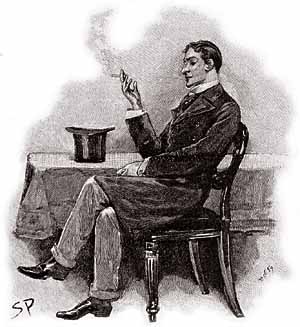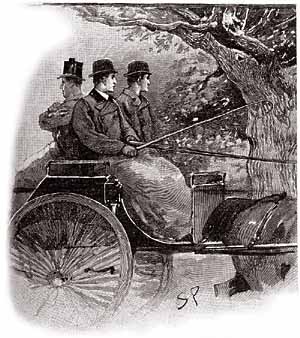In the 1986 Granada Television adaptation of “The Musgrave Ritual,” Sherlock Holmes and Dr. Watson arrive at Hurlstone Manor for a holiday
– much needed (on Holmes’s part) and much encouraged (on Watson’s part). They
are greeted by Reginald Musgrave, and the conservation is polite, if a little
stilted. Finally, Holmes and Musgrave walk off alone – leaving Watson in
friendly conversation with Brunton, the butler. Musgrave compliments Holmes on
making a successful living off of his wits, to which Holmes replies, while
looking about absently: “And how is the dear wife?” A brief silence follows
before Musgrave replies: “I’m not married, Holmes.” There is another, longer,
more awkward silence before Holmes claps Musgrave on the shoulder: “How wise!”
 |
| Photo Credit: bookishadventures.tumblr.com |
And that is the disconnect with Reginald Musgrave; that is
what separates Musgrave from other figures from Sherlock Holmes’s past – Victor Trevor, for example. Although the plot of MUSG was slightly altered for the
Granada adaptation to compensate for the somewhat advancing ages of the series’
stars – Jeremy Brett, for example, was 53-years-old at the time of filming and
was therefore perhaps ill-suited to play the 25-year-old Sherlock Holmes as seen
in the original text of MUSG – the dynamic between Holmes and Reginald Musgrave
remains true to the source material. Holmes and Musgrave are not friends. That
is not to say that they are antagonistic, far from it. They are merely
acquainted. Musgrave spins in and out of Sherlock Holmes’s orbit in much the
same way as any of his other clients. At times there seems to be no difference
between Reginald Musgrave and Violet Hunter, Victor Hatherley, or Grant Munro –
that is to say, once they have served their purpose, they are rarely, if ever,
heard from again. Musgrave at least has the added benefit of being openly
appreciative of Holmes’s talents, where many had seemed initially incredulous: “Once
or twice we drifted into talk, and I can remember that more than once he
expressed a keen interest in my methods of observation and inference.”
But like Victor Trevor, Reginald Musgrave intrigues because
he knew Sherlock Holmes when. He knew
him when he was young and was not yet
fully formed or fully in possession of his powers. He knew him when his career as the world’s only
consulting detective was not yet sculpted out or defined to his satisfaction.
More importantly, Reginald Musgrave knew Sherlock Holmes when Dr. Watson did not. Reginald Musgrave was present at the beginning of Sherlock Holmes – which for
some Sherlockians is somewhat equivalent to being present for the Big Bang –
and so he is in possession of a piece of the puzzle, which we are not. But does
that truly lend any extra weight to Musgrave’s presence in the Canon – does
that give him more merit as a character, when Holmes appears to give him the
same level of consideration as the dottles and plugs of tobacco left on the
mantelpiece of Baker Street every morning?
Unlike Victor Trevor, who was present from the very
inception of Holmes’s career (“And that recommendation, with the exaggerated
estimate of my ability with which he prefaced it, was, if you will believe me,
Watson, the very first thing which ever made me feel that a profession might be
made out of what had up to that time been the merest hobby.” [GLOR]), Holmes
appears to lose track of Reginald Musgrave for a bit of time before their paths
cross again: “For four years I had seen nothing of him until one morning he
walked into my room in Montague Street. He had changed little, was dressed like
a young man of fashion–he was always a bit of a dandy–and preserved the same
quiet, suave manner which had formerly distinguished him.” Holmes’s description
of this first meeting with a long-lost acquaintance is rather interesting, in
that he manages to both insult and compliment Musgrave in the same sentence. It
is up to the reader to determine if the balance of the remark is ultimately
neutral. But the casual way in which Holmes marks the length of their separation
indicates that it was all the same to him if Musgrave had never walked through
his door at Montague Street at all, save for the puzzle he brought with him.
According to Leslie Klinger: “Holmes and Musgrave were never
more than ‘slight acquaintance(s)’: thus it is possible that the struggling
young detective saw not a social visit but a business opportunity when Musgrave
walked through his door. June Thomson speculates that Holmes may have charged Musgrave
a fee for his services, pointing to his ‘living by my wits’ remark as ‘possibly
a hint that he had turned professional and expected to be paid’” (534). And so,
the reader sees Reginald Musgrave present at the time when Holmes has begun to
realize that his services had value.
Musgrave may not be the Detective’s first paying client, but he was probably
one of the earliest. Victor Trevor may have been present for the beginning of
Sherlock Holmes, but Reginald Musgrave was present for the event horizon – for the
point of no return, for the moment when Holmes’s fate was fully determined and
guaranteed.
As has been mentioned before, Holmes ultimately lost track
of Victor Trevor – just as he lost track of Musgrave – but that was hardly
Holmes’s fault entirely – the sordid circumstances surrounding his father’s
death were certainly enough to make a reasonable man want to escape any and all
places and persons associated with the events. The weight and merit of Trevor’s
character rest largely on what he was present for, and Musgrave bears much the same burden. Though of the two
men, Victor is the only one who can honestly wear the title of “friend,” Musgrave
is the only one who can be honestly called a “client” – in the fully paying
sense of the term. And while Victor Trevor sought out Sherlock Holmes in his hour of need, Reginald Musgrave walked
through the door of Montague Street looking for a detective.
oOo
“Better Holmes & Gardens” now has its own
Facebook page. Join by “Liking” the page
here, and receive all the latest updates, news, and Sherlockian tidbits.



Your thoughts on Reginald Musgrave suggest a further blog post on similar aristocrat portraits - Sir Henry Baskerville, Musgrave,the Duke of Holderness seem bound and shaped by their ancestry... whereas Holmes(and Watson) are free Bohemian souls. Perhsps Holmes senses he and Musgrave inhsbit different planets.
ReplyDeleteYour approach in this essay is so illuminating because, as individually distinctive a person as Sherlock Holmes is, he is also a man enmeshed in a web of important relationships to friends, associates, clients, adversaries and, of course, his inimitable brother. However antisocial Sherlock's temperament appears at times, he is inescapably a social being, as we all are. One element of Conan Doyle's genius is the way he situates his thoroughly eccentric character in an equally eccentric network of associations. I love the way you bring out the rich significance of his rather slight connection to Reginald Musgrave. Holmes couldn't become Holmes, the private consulting detective, on his own; he needed that first client. Musgrave did him a better turn of friendship than any personal sympathy between them could have achieved, as you show.
ReplyDeleteI admire Granada's brave attempt to adapt The Musgrave Ritual, though I don't think it was quite successful. And it lost this added element of youth--what really happened around the time that Holmes burst on the scene, seemingly sui generis. :)